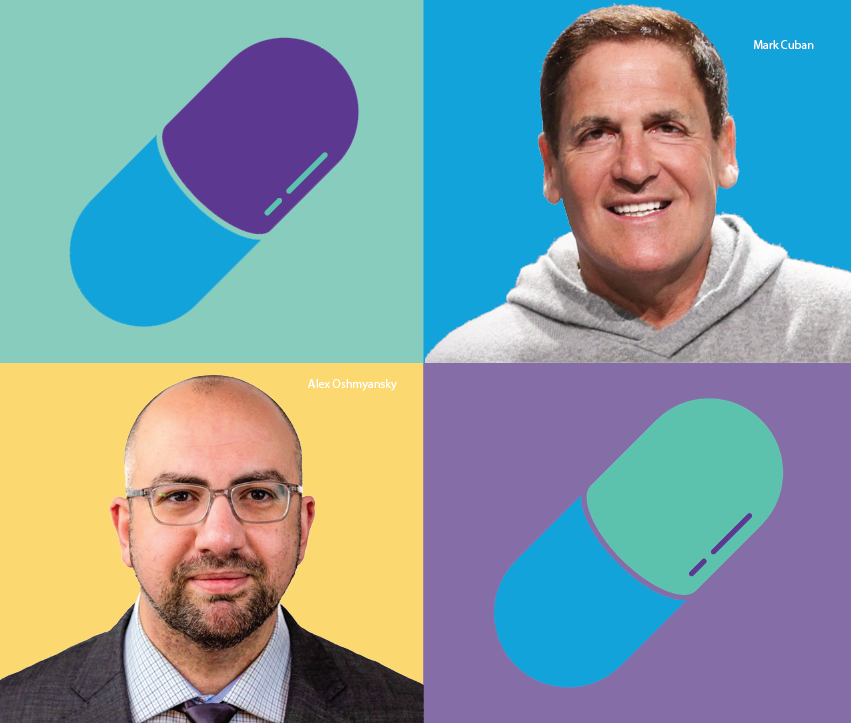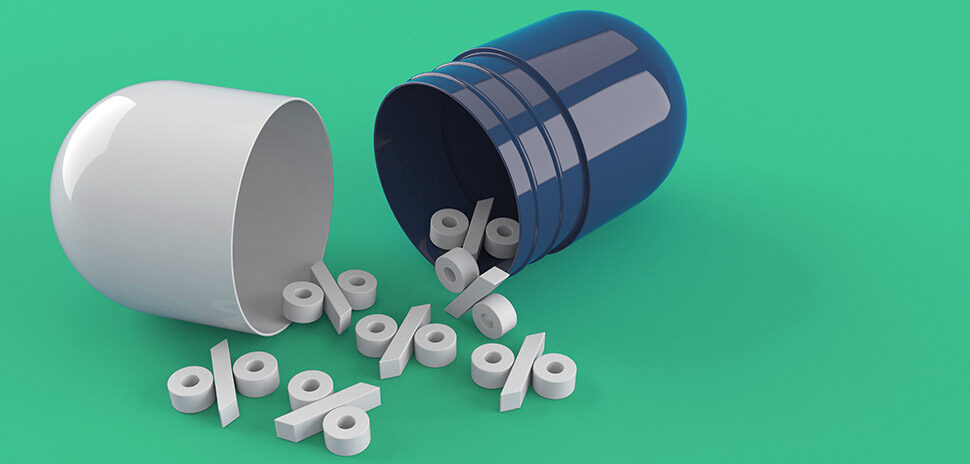Two years ago, Mark Cuban took on Big Pharma by launching his Dallas-based online pharmacy, the Mark Cuban Cost Plus Drug Company. On Monday, he and his co-founder took part in a White House roundtable on lowering healthcare costs and bringing transparency to prescription drug middlemen.
Cuban’s co-founder and the company’s CEO, Dr. Alex Oshmyansky, dropped big news at the event: Cost Plus Drugs will begin manufacturing its own medications this week at its facility in Dallas’ Deep Ellum neighborhood.
“Cost Plus Drugs is proudly bringing pharmaceutical manufacturing back to the U.S. with advanced robotic and AI computer vision technology that allows us to pivot from making one drug type to another very rapidly—in principle, within four hours,” Oshmyansky said at the White House.
The technology allows the company to pivot, fast. “Whatever product is in shortage we can start making that product,” the CEO said.
In 2021, Cuban’s company began work on its $11 million, 22,000-square-foot Deep Ellum plant with a plan to manufacture its own generic drugs. “At our manufacturing plant, we’ll be making drugs nobody else is willing to make at needed quantities due to a lack of profit,” Oshmyansky told Dallas Innovates in 2022. “It will allow us to provide products … that otherwise have extremely high margins from manufacturers.”
The facility near downtown Dallas just finished construction and validation. Oshmyansky said Mark Cuban Drug Company will start making its first commercial batches of product this week. Beginning with epinephrine and norepinephrine for patients in intensive care units, he expects to add pediatric chemotherapy products next.
“No parent should be told the chemotherapy their child needs is not available; nobody should not get the life-saving ICU medications they need; or have to postpone their surgery because the common cheap medications are just not available in the U.S.,” he said.

Mark Cuban Cost Plus Drug Company co-founders Mark Cuban, at upper right, and CEO Dr. Alex Oshmyansky [File photos]
Roundtable included administration officials, community pharmacies, Kentucky governor, and more
At the White House, senior officials from across the Biden administration including National Economic Advisor Lael Brainard, Domestic Policy Advisor Neera Tanden, Secretary of Health and Human Services Xavier Becerra, and FTC Chair Lina Khan convened “a listening session.” They met with leaders including Kentucky Governer Andy Beshear, Blue Shield of California COO Sandra Clarke, Cuban and Oshmyansky, and representatives from community pharmacies to discuss President Biden’s work to lower health care costs and hear ideas for bringing transparency to prescription drug middlemen,” the White House said.
During the roundtable, reforms were highlighted that could promote transparency and competition in pharmaceutical markets, support independent pharmacies, and lower drug costs.
“Duty calls,” Cuban said when asked about his business model. But, he said the real question that he was there to answer is simple: “Why does Cost Plus Drugs exist in a world where three PBMs dominate?”
Cuban was also ready to discuss how a company launched in January 2022 could even “get to this table.”

Rendering of Mark Cuban Cost Plus Drug Company’s manufacturing plant in Dallas’ Deep Ellum neighborhood. [Image: Jacobs]
A 15% markup, a $3 handling fee, and a $5 shipping fee
Cost Plus Drugs “bypasses middlemen” by working directly with drug manufacturers in order to offer lower prices. The company sells generic drugs to consumers for a 15% markup, a $3 pharmacy handling fee, and a $5 shipping fee, and says it “transparently displays what it pays for its medicines.”
The “middlemen” the company is trying to bypass are pharmacy benefit managers, known as PBMs, who manage prescription drug benefits for clients including health insurers, Medicare Part D drug plans, and large companies.
Those middlemen caught quite a bit of heat at the roundtable.
Cuban criticizes a lack of transparency
At the White House, Cuban pointed to a lack of transparency with PBMs, noting that their contracts are shrouded in secrecy, and that discussing or making public details about such contracts can lead to legal actions.
“The number one rule when contracting with PBMs is that you don’t talk about the PBMs and their contracts, whether provider, manufacturer, employer, or non-affiliated pharmacy,” Cuban said. “They prevent making public or discussing their pricing terms or any aspect of their contracts—and if you do they are happy to sue you.”
So what motivations might PBMs have for that stance? Per Cuban, they classify certain drugs as “special” so they can charge more for them, even when many of these drugs are generic and require no special handling. That results in high costs for drugs that are significantly cheaper at Cost Plus Drugs, Cuban said.
“The PBMs have decided to take the drugs they can charge the most for and call them special,” Cuban said. “There’s nothing special about most of these drugs—many are generic, small-molecule drugs. Nor is there anything unique about the captive pharmacy they call special, and as we’ve heard, force their customers to buy from.”
Cuban said the company has had patients say they have been charged as much as “100 times more for specialty drugs.”
Cuban said most CEOs aren’t aware of how rebates from PBMs actually work, and how they can lead to higher employee deductibles.
“I genuinely believe that CEOs do not understand how their health care costs work, particularly as it applies to the rebates they receive from their PBMS,” Cuban said at the White House. “They tend to look at rebates as cash paid by the drug manufacturers. Nothing could be further from the truth. The reality is that the rebates are not paid for by the drug manufacturers—the rebates are paid for by these companies’ sickest and oldest employees.”
“Rebates are also the reason big PBMs often restrict the medications they allow to be filled,” he added. “They will often only reimburse for drugs that pay them significant rebates, excluding those that don’t.”
Accusing PBMs of…well, read below
Cuban’s ire got the best of him when he accused PBMs of “shitting on independent pharmacies” like his own.
“I couldn’t find a better word,” Cuban said. “That is the appropriate word to describe the financial abuse that we’ve heard about … these pharmacies have zero leverage, so when the PBMs say they must pay a DIR fee that is calculated on a whim by the PBM, they must pay it.”
So-called “captive pharmacies” have been described as getting most of their prescription volume from a single manufacturer or a single product, and accused of promoting a manufacturer’s drug when generics are just as effective at far lower cost.
Cuban also said PBMs conduct audits on independent pharmacies and “invent issues,” knowing that the pharmacies often can’t afford the legal battle to fight back. He said he had talked to one independent pharmacist facing $200,000 in fines, which could potentially put the pharmacy out of business.
‘What do you think we’d say about that on “Shark Tank”‘?
Cuban said independent pharmacies purchase medication inventory and take on financial risk, and are then expected to absorb losses when PBMs reimburse them for less than they paid for the medications.
“What do you think we’d say about that on ‘Shark Tank’?” he told the roundtable.
Cuban held up Cost Plus Drugs as one fix for the situation, and a model of how transparency could transform the cost of prescription drugs in America.
“At Cost Plus Drugs, our product is trust,” Cuban said. “We believe that trust comes with transparency. Cost Plus Drugs’ business model is amazingly simple: We buy drugs and we sell drugs. No rebates. No magic. No complications. We keep our business simple, which allows us to keep our pricing so low.”
Cuban offers his own prescription for fixing the industry
Cuban offered his own prescription for fixing the prescription drug industry, and it starts with having the powers that be stop doing business with the industry’s three major pharmacy benefit managers.
“Here’s the crazy part: The reality is, there is a fix,” Cuban said. “Have the federal government, the states—as we’ve seen with Governor Beshear in Kentucky—and self-insured employers stop doing business with the big three PBMs.”
“There is not a single thing that those big three PBMs do that is unique or can’t be replaced by Dr. Price’s company [Price Pharmacies and Oread Rx] or any other independent,” he added.
Switching out from those big PBMs and using their competitors instead could “change an entire industry in less than five years,” Cuban said.
Oshmyansky detailed Cost Plus Drugs’ business model
Oshmyansky, Cost Plus Drugs’ co-founder and CEO, spoke at the White House about his company’s business model and its approach to pharmaceutical manufacturing and distribution. His big focus was on technological innovation and the strategic shift Cost Plus Drugs is making to address both drug shortages and high costs.
He noted that an array of systemic issues contribute to drug shortages and high costs, including PBM practices and a fragile supply chain—especially with the industry’s heavy reliance on China for pharmaceutical ingredients.
“The PBMs set up so-called ‘source programs’ in conjunction with the big pharmaceutical wholesalers,” Oshmyansky said. “Source programs control 90% of drug purchasing in the United States. Since there are only three real buyers, that means if a generic pharmaceutical company doesn’t have a source program contract, there’s no reason for them to keep their supply lines working. So what you wind up with is generic companies shutting down their manufacturing lines.”
“Since the main criteria to win a contract is price, the companies that win contracts often have to cut corners to get prices as low as they can,” he said. “That leads to an extremely brittle supply chain. Only a few companies make a given drug, and they’re prone to either being shut down by the FDA for unsafe practices or having their manufacturing lines physically break.”
Oshmyansky said Cost Plus Drugs aims to get around those issues by manufacturing its own drugs in-house using advanced technology, committing to transparency, and bypassing traditional PBM channels to sell directly to the public.
“Just as important as the technology we are introducing, bypassing the PBMs and the source programs allows us to directly sell our products in times of need without being blocked by middlemen,” he added. “We are pledging to be transparent in our pricing, publishing our true manufacturing cost of operating, and adding a flat markup. That way, we are profitable and sustainable—but never extortion.”
![]()
Get on the list.
Dallas Innovates, every day.
Sign up to keep your eye on what’s new and next in Dallas-Fort Worth, every day.


































































